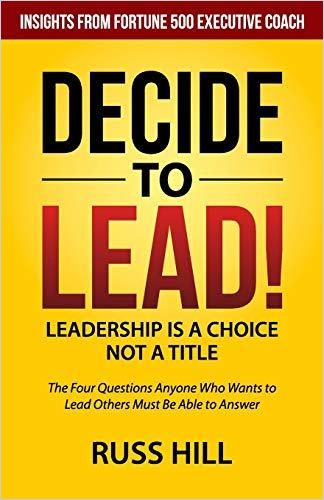Podcaster Russ Hill offers a vital primer for all new or aspiring leaders.

How Leaders Should Lead
Russ Hill, host of The Culture Hacks Podcast, defines quality leadership and explains how to practice it. Worthwhile leaders, he says, secure positive results, serve as role models and take on the tough challenges of being in charge – and their people and their organizations benefit accordingly. Quality leadership accounts for the difference between customer-friendly firms you love to do business with and those you avoid because they treat you badly.
A Conscious Choice
All leaders make a conscious choice to lead because they believe they can have a positive impact on other people’s lives. Don’t think that wanting to be a leader automatically makes you good at it. Sadly, the world is full of terrible leaders. But you can learn to be an effective leader.
Leadership allows you to see, hear, learn and feel things you would never encounter if you didn’t raise your hand and volunteer yourself as a leader. Russ Hill
Choosing to be a leader isn’t for everyone. Leaders need to orient their thinking to the future, where results happen. For example, Amazon’s Jeff Bezos instructs the leaders in his companies to think five to seven years ahead.
Basic Leadership
Organizations often experience unpleasant shocks when the overachievers they promote into management turn out to be ineffective leaders. Your organization won’t judge you on your personal productivity, but on the productivity of those you lead. So, Hill advises, instead of doing your team members’ work for them, help them improve. Demonstrate a sound work ethic and help your people come to understand your actions and reasoning in a continual watch-discuss-learn cycle.
Pivotal Questions
Those who want to lead, Hills says, should ask themselves a few pivotal questions. Are you sure you want to lead? Can you envision a goal and describe it, so others can share it? Can you delegate? And, are you able to stand alone if you make a decision others dislike?
Choosing to be a leader isn’t for everyone. Many people are content to follow others and perform the work their leaders assign. If you take on leadership, expect people to criticize any solution you propose or implement. Problems often have multiple possible solutions, and people may not like yours. Consider their feedback seriously, then either adapt or stand by your decision – even if you must stand alone.
Then consider four other questions, Hill urges. Do you have the humility to be a servant leader? Leaders must serve their employees. This level of humility, which many leaders find difficult to balance with the confidence they need to lead, is the inspiring extra ingredient leaders offer to motivate people and build loyalty.
Leadership is not about titles, positions or flowcharts. It is about one life influencing another.John C. Maxwell
Are you willing to defy the status quo? Many managers are happy to go along with the way things are, good or bad. Genuine leaders seek to make things better.
Can you change yourself and grow? Leaders should be role models of effective change. Rely on feedback to know where and when you need to change, and adjust your leadership style and methods accordingly.
And can you focus and tune out “the noise?” Any work environment comes with an unavoidable level of distraction, particularly the digital world. Focus on your work, and don’t allow anything to draw you away from your job as leader.
Training
Companies give only a relatively few managers and executives the benefit of directed training. Organizations tend to leave new leaders to sink or swim. One result is that many so-called leaders do no leading at all. People who merely tell others what to do aren’t leaders. Many newly appointed leaders struggle as they try to fulfill roles they don’t understand and for which their organizations offered no useful preparation.
Leadership is facilitating movement in the desired direction in a way people feel good about.Tom Smith, co-author, The Oz Principle
Effective leadership takes effort, specific training, collaboration and self-development. At its most basic level, leadership involves initiating positive movement that benefits others.
Positive Results
Prepared leaders who aim high and do the right things can achieve great outcomes. Consider Jeff, the CEO of a successful food-manufacturing firm that employs thousands of workers. Jeff is a take-charge guy who wants to make good things happen and never feels satisfied with the status quo. He believed that with the right moves – on his part and the company’s – it could do better.
To that end, Jeff decided to make employee engagement one of the company’s three most essential metrics. He related the other two metrics to revenue and profit. Within eight months, employee engagement had moved past just OK to “best-in-class.” Jeff assumed, logically and correctly, that since his employees were now more engaged and more satisfied with their work, operations, sales and profits would improve – as they gradually did.
Take Charge
A leader’s job is not running meetings or guiding committees. It’s not catering to the needs of your employees – although that’s important. Your main job is not monitoring expenses, though you are derelict if you don’t.
I find one thing very motivating – I love people counting on me. And, so, today it’s easy to be motivated because we have millions of people counting on me.Jeff Bezos
Your job is to carry the flag. You’re the decision-maker, the take-charge, go-to person. You own all the problems, failures and successes that occur on your watch. You’re always on stage, for all to see and criticize. Thus, Hill warns, you must be tough-minded.
Leading Isn’t Easy
Leaders must listen, and be open to other people’s ideas. Strong leaders make decisions when they believe they possess the requisite information. But, particularly when everything hinges on your decisions, leadership is difficult.
I used to describe the nature of the presidency as having to make decisions about issues that nobody else could solve, or are basically insolvable, or at least not perfectly solvable. By definition, if a problem had an obvious solution to it, somebody else would have solved it before it got to me.President Barack Obama
However, the benefits of leadership far outweigh the disadvantages. First, you will experience the satisfaction of watching the people you lead overcome their challenges and succeed for themselves and for your organization. You will also find that leadership extends your influence, lets you shape your organization and its performance, and improve the lives of the people you lead. And, you’ll make more money than most of your colleagues.
Only accountable leaders earn these benefits. Leaders who don’t hold themselves accountable are not leaders at all. When things go wrong, never blame others; hold yourself responsible and fix the situation – as quickly as you can. You must always state a clear position and make the difficult decisions.
Successful leaders make life better for their people and their organization.
Leadership 101
Russ Hill writes with brevity and keeps things on point. His quite basic manual hits all the salient, relatively obvious, aspects of leadership. Those already leading probably know – or learned the hard way – everything Hill cites. He offers crucial, core information for up-and-coming or brand-new leaders who need a primer to alert them to everything leadership entails. But Hill never pads his text or repeats himself. He holds leaders to high moral and performance standards. That, and his wit, makes this an essential leadership guide.
Russ Hill co-wrote The Great Resignation with Jared Jones. He and Jones co-authored Remoteability with Tanner Corbridge.











